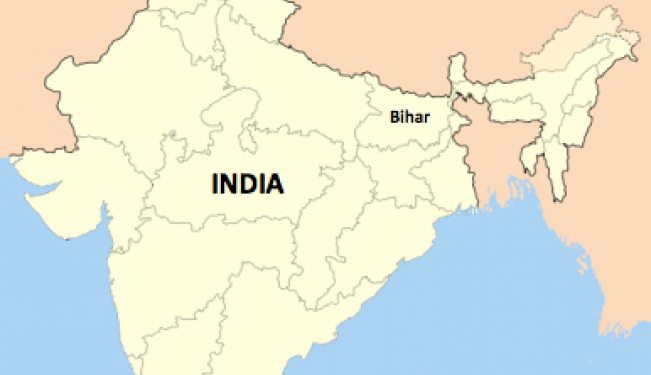The fertile plains of Bihar have long played an important role in the history of the sub-continent giving birth to both great empires and sweeping religious movements. Indeed the state's very name is derived from 'Vihara', the land of monasteries. Prince Gautama achieved enlightenment as the Buddha meditating under a tree in Bodhgaya while Mahavira, the founder of Jainism, was born in Vaishali. Nearly two thousand years later Gobind Singh, the last Sikh guru, was born in Patna Sahib.
The Mauryan Empire by the 3 Century BC spread its power from Assam in the east to Afghanistan in the west, uniting virtually the entire sub-continent under its rule. Its rulers benefited from the realpolitik teachings of the Arthashastra, which predated The Prince by almost two millennia. Its most famous leader, Ashoka the Great, ruled from Pataliputra (modern day Patna), converted to Buddhism and promoted non-violence after winning a particularly bloody war. Pillars bearing his edicts were erected throughout India and provide the modern day Indian state with its lion-headed seal.
century AD to 1198 when it was destroyed by the invading Turks. In the medieval period, Bihar was devastated by warfare and lost its prominence save for a brief perid when Sher Shah Suri became the Emperor of India for a brief period from his power base in Sasaram. In 1764 Bihar was annexed to the Bengal Presidency by the British. In 1917 Gandhi chose the Champaran district as the site for his first non-violent resistance movement, siding with starving cultivators against powerful English indigo cultivating landlords backed by a colluding administration.
After independence, as the stable dominance of the Congress party, fractured over time. Bihar came to represent the example par-excellence of the dangers of venal caste politics as the governance of the state steadily deteriorated from the 1970s onwards.
Out of the unstable coalition which toppled Indira Gandhi in 1979, Lalu Prasad Yadav rose to prominence in Bihari politics, capturing the Chief-Ministership in 1990 through the clever manipulation of caste loyalties. After he was forced out of office in the wake of a massive corruption scandal in 1997, his near-illiterate wife Rabri Devi replaced him in the top spot. Under Lalu Prasad Yadav, Bihar descended into a 'jungle raj' as criminal elements ran rampant, corruption in government was the norm and ordinary citizens were afraid to walk the streets after dark.
In 2005, however, Nitish Kumar ended Lalu Prasad Yadav's fifteen year rule in a historic electoral upset, promising to restore integrity and law and order. Over the last five years Nitish has begun to turn the state around and was rewarded with a landslide victory in the November 2010 state elections.
For more than 10 years, Fair Observer has been free, fair and independent. No billionaire owns us, no advertisers control us. We are a reader-supported nonprofit. Unlike many other publications, we keep our content free for readers regardless of where they live or whether they can afford to pay. We have no paywalls and no ads.
In the post-truth era of fake news, echo chambers and filter bubbles, we publish a plurality of perspectives from around the world. Anyone can publish with us, but everyone goes through a rigorous editorial process. So, you get fact-checked, well-reasoned content instead of noise.
We publish 2,500+ voices from 90+ countries. We also conduct education and training programs on subjects ranging from digital media and journalism to writing and critical thinking. This doesn’t come cheap. Servers, editors, trainers and web developers cost money.
Please consider supporting us on a regular basis as a recurring donor or a sustaining member.
Support Fair Observer
We rely on your support for our independence, diversity and quality.
Will you support FO’s journalism?
We rely on your support for our independence, diversity and quality.




